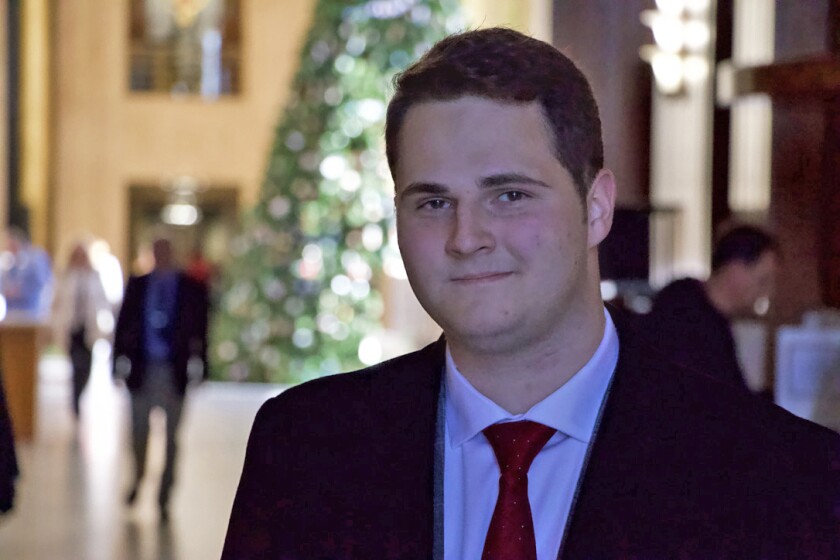BISMARCK — Conservative North Dakota lawmakers have backed a flurry of bills meant to restrict health care, activities and personal expression for transgender residents.
Supporters of the proposals say they protect children from left-wing ideology. LGBTQ advocates say the wave of anti-transgender legislation is bigoted and harmful.
The Republican-backed bills in the legislative pipeline range from prohibitions on gender-affirming care for minors to restrictions on transgender girls’ participation in high school sports.
A Bismarck-area lawmaker said the goal behind his bills is to shield children from damaging and disturbing experiences.
“There is a broader assault on children’s innocence in this country, and if somebody — if I don’t step up to it, I’m worried that no one else will,” said Republican Rep. Brandon Prichard.
ADVERTISEMENT
The fight over the controversial bills kicked off Wednesday, Jan. 18, when a dozen LGBTQ advocates pleaded with a panel of legislators to kill a proposal that would bar the use of personal pronouns by transgender residents at public schools and agencies.
Katrina Jo Koesterman, president of advocacy group Tristate Transgender, said in an interview Tuesday that the bills represent a “waste of time” for the Legislature and would result in more violence toward the transgender community if passed.
“I think it sends a dangerous message that we’re not welcome here,” Koesterman said. “It increases the general atmosphere of hostility and hatred towards the transgender community.”
The 37-year-old Moorhead, Minnesota, resident, who identifies as transfeminine and nonbinary, said the transgender community has become “an easy target” and a “convenient scapegoat” for the Republican Party.
“Throughout history, conservative factions have always needed some sort of minority to attack in order to gain popularity with their base, and we just happen to be the latest boogeyman,” Koesterman said.
House Majority Leader Mike Lefor, R-Dickinson, said, “It’s incumbent on all of us to have a better understanding of what transgender people go through. I myself would like to be educated more about that topic, so we need to be understanding about what they’re going through in their lives and do the very best that we can to make sure that they’re getting the assistance they need.”
But he said he supports lawmakers bringing bills forward “that might be controversial” and if “public policy needs to be tweaked in a certain fashion.” Committees, the House and the Senate vet and weigh in on the proposals, he said.
House Minority Leader Josh Boschee, D-Fargo, said the bills “are not coming from a place of opportunity or inclusion. They’re coming from a place trying to exclude people from participating in our communities.
ADVERTISEMENT
“I think it’s easier for these legislators to target children. It’s why we see the majority of (the bills) going after children, and I think that’s disappointing, especially when we’re looking at a state trying to see how can we hold on to all of the talent we have,” Boschee said.
Restricting pronouns
Senate Bill 2199 sponsored by Sen. David Clemens, R-West Fargo, would require those affiliated with schools and other entities receiving public funding to refer to people using pronouns and gendered terms that align with their “determined sex at birth, male or female.”
The legislation would apply to all “policies, records, forms, rules, standards, procedures, guides, materials, instruction, training, correspondence, advertising, or marketing used by any entity receiving state funding.” Violators of the bill would be fined $1,500.
Clemens said the proposal “does not publicly outlaw an individual’s personal expression, but it does outlaw the use of public funds to promote or support anything that is contrary to a person’s biological sex at birth.”
The bill aims to “uphold truth” about people’s biology when they identify as a gender other than their birth sex, Clemens said.
Clemens struggled to tell the Senate Judiciary Committee on Wednesday how his bill would be enforced or in which situations it would apply.
The bill drew 94 pieces of testimony, all but one in opposition. The only other testimony was neutral to the bill.
After Clemens left the committee room, Christina Feldmann confronted him, telling the lawmaker about her daughter, Haley, a transgender woman who died by suicide in 2021.
ADVERTISEMENT
Feldmann of Beach, North Dakota, told Clemens that using Haley’s personal pronouns was “the simplest way to validate her.”
“If she were to have gone to a school that referred to her as he/him, we would have lost her much sooner,” Feldmann said to Clemens. “Your bill will kill children. It’s important that you be aware of that.”
Clemens repeatedly referred to Haley as “your son” when speaking to Feldmann. The lawmaker also asked the mother if she took Haley to “counseling or help to bring her back to thinking that she was a boy.”
Koesterman, the Tristate Transgender president, said Clemens’ bill “essentially erases transgender identity from the Century Code.” She said the legislation is a major threat to the legal rights of transgender and gender nonbinary residents.
Other opponents of the bill noted that it might violate the U.S. Constitution’s right to free speech.
The Republican-led committee gave Clemens’ bill a unanimous “do not pass” recommendation. Several members noted their agreement with the aim of the legislation but said it is poorly written and likely unenforceable. The bill will now go to a Senate vote.
Sen. Larry Luick, R-Fairmount, said he is introducing Senate Bill 2231, at the request of the North Dakota Catholic Conference’s executive director.
The bill would make it a discriminatory practice for a government entity to require an employee to use a person’s “preferred pronoun” unless required by law. It also would ban school policies, instruction and professional development on “expressed gender,” or “a gender identity, whether expressed through behavior, clothing, mannerisms, preferred pronoun, or physical characteristics, which does not conform to the student’s sex.”
Luick said he’s been in “situations where a young person has demanded that they be called the pronouns, and I don’t like that. I think that their given name is more appropriate for them.”
The Richland County lawmaker said he’s “never been an opponent” of LGBTQ issues, that “any one of those persons are exactly equivalent to what I am as a heterosexual male.”
“We don’t even as a government, I don’t even think we should be going down those roads, but I think some of these cases, I really feel that (adults and children) are doing this for attention, and I’m just worried that the harmful problem with all of that is that it backfires in a negative way,” he said.
A hearing has not yet been scheduled for the bill.
Gender-affirming care
Two pieces of connected legislation would ban and criminalize gender-affirming surgeries and treatment for transgender children in North Dakota.
Under House Bill 1254, doctors who perform sex reassignment surgeries or prescribe hormone treatment or puberty blockers to transgender minors would be guilty of a Class B felony, punishable by up to 10 years in prison and a $20,000 fine. The proposal is sponsored by Rep. Bill Tveit, R-Hazen.
Rep. Brandon Prichard, R-Bismarck, is backing House Bill 1301, which would create a civil penalty applying to doctors who perform gender-affirming care for minors and to parents who approve the treatments for their children. The bill also allows the attorney general to pursue hefty financial penalties against doctors for performing gender-affirming care.
Prichard, a 21-year-old college student, said his bill aims to “give minors justice” after “the mental anguish and the damages they had to go through.”
The legislator previously told Forum News Service the proposed ban on gender-affirming care would protect vulnerable kids from a social contagion proliferated by left-wing political ideology.

Jeremy Turley / Forum News Service
Bismarck psychiatrist Dr. Gabriela Balf diagnoses and treats teens experiencing gender dysphoria — characterized by the American Psychiatric Association as a psychological distress due to a mismatch between one’s gender identity and one’s assigned sex at birth.
As an industry standard, children receive no gender-affirming medical treatments prior to puberty, Balf said.
After puberty begins, children diagnosed with gender dysphoria may receive puberty blockers. The injections “hit the pause button” on the development of secondary sex characteristics, such as breasts in women and facial hair in men, Balf said. The effects of the blockers are reversible, she noted.
Few transgender adolescents in North Dakota are given sex hormone treatment before their 18th birthday, Balf said. Hormone therapy — usually in the form of estrogen pills or testosterone injections — produces physical changes that would normally occur during puberty. Its effects are partially reversible, Balf said.
Gender-affirming surgery, also known as sex reassignment surgery, has never been performed on a minor in North Dakota, Balf said.
Transgender adolescents already suffer from extremely high rates of suicide, depression and drug use, the doctor said. Barring them from seeking gender-affirming care would make the problem worse, she added.
About 30% of transgender high school students in North Dakota reported a recent suicide attempt, according to data from a 2021 statewide survey aggregated by LGBTQ suicide prevention advocate Faye Seidler.
Prichard said he believes gender dysphoria is a legitimate diagnosis and he has “complete compassion for those people,” but he thinks “entertaining a dysphoria is wrong.”
“Treating them with care and real psychological help is how we should be treating it and not by giving them medications that alter their body or allowing them to access surgeries,” Prichard said.
In recent months, courts have blocked laws to ban gender-affirming care for minors in Texas, Alabama and Arkansas.
Hearings for the two bills have not yet been scheduled.
Sports participation
Rep. Ben Koppelman, R-West Fargo, has introduced House Bill 1249, which would restrict K-12 transgender athletes, similar to legislation Gov. Doug Burgum vetoed in 2021. The House overrode the governor’s veto; the Senate sustained it. That meant the 2021 bill did not become law.
Supporters say such legislation ensures fairness in girls sports, while opponents say it targets transgender kids. Koppelman disputes that the bill is anti-transgender.
“That term (transgender) is not used in the bill at all. It’s a female sports bill, and all it does is reaffirm Title IX … which ensured that girls and women had an opportunity to compete with those of their sex to try to create the most fair competition possible, so it’s a female sports bill, not a transgender bill,” Koppelman said.
Burgum in his 2021 veto cited the North Dakota High School Activities Association’s existing transgender student regulation, as well as the bill “creating a ban with myriad unforeseen consequences.”

Jeremy Turley / Forum News Service
Koppelman said this year’s bill stands a better chance for a veto-proof majority in the House and Senate due to turnover in the Legislature, nearly a third of which is new members.
A hearing has not yet been scheduled for the bill.
Conversion therapy and drag shows
Prichard is sponsoring House Bill 1332, which would cement in law that performing conversion therapy on LGBTQ residents is “not an ethical violation” for social workers in the state.
Conversion therapy aims to alter LGBTQ patients’ sexual orientation or gender identity to fit straight, cisgender norms. Professional organizations, including the American Psychiatric Association and the American Psychological Association, have condemned the practice as traumatizing and ineffective.
The proposal aims to overturn an administrative rule approved by a panel of lawmakers in 2021 that established an ethical standard to prevent conversion therapy. Social workers supported the 2021 rule, arguing it would safeguard people seeking care.
Prichard said the rule is “dangerous” because it closes off an option for consenting North Dakotans to seek the controversial therapy. The lawmaker believes residents should have a path to pursue the therapy if they please.
Balf said Prichard’s desire to contradict decades of study on the harmful effects of conversion therapy suggests a “degree of arrogance that is staggering.”
“(Prichard) is free to put whatever jokes he wants through the system instead of having the system work toward real problems,” Balf said. “I think the tragedy will be if our legislators take him seriously.”
House Bill 1333, also sponsored by Prichard, would prohibit “adult-oriented performances,” including drag and cabaret shows, in the presence of minors and on public property.
Prichard said the legislation aims to protect children and doesn’t target a specific community.
“There’s this weird push to have children involved in these explicit, obscene performances. It doesn’t have to be straight or gay. It’s so strange and so obscure to me,” Prichard said. “All of those things regardless should be banned for children, and those children shouldn’t have to go through that visual imagery or be able to perform in those events.”
Hearings for House Bills 1332 and 1333 have not yet been scheduled.
Jeremy Turley is a reporter for Forum News Service. Jack Dura is a reporter for The Bismarck Tribune.







